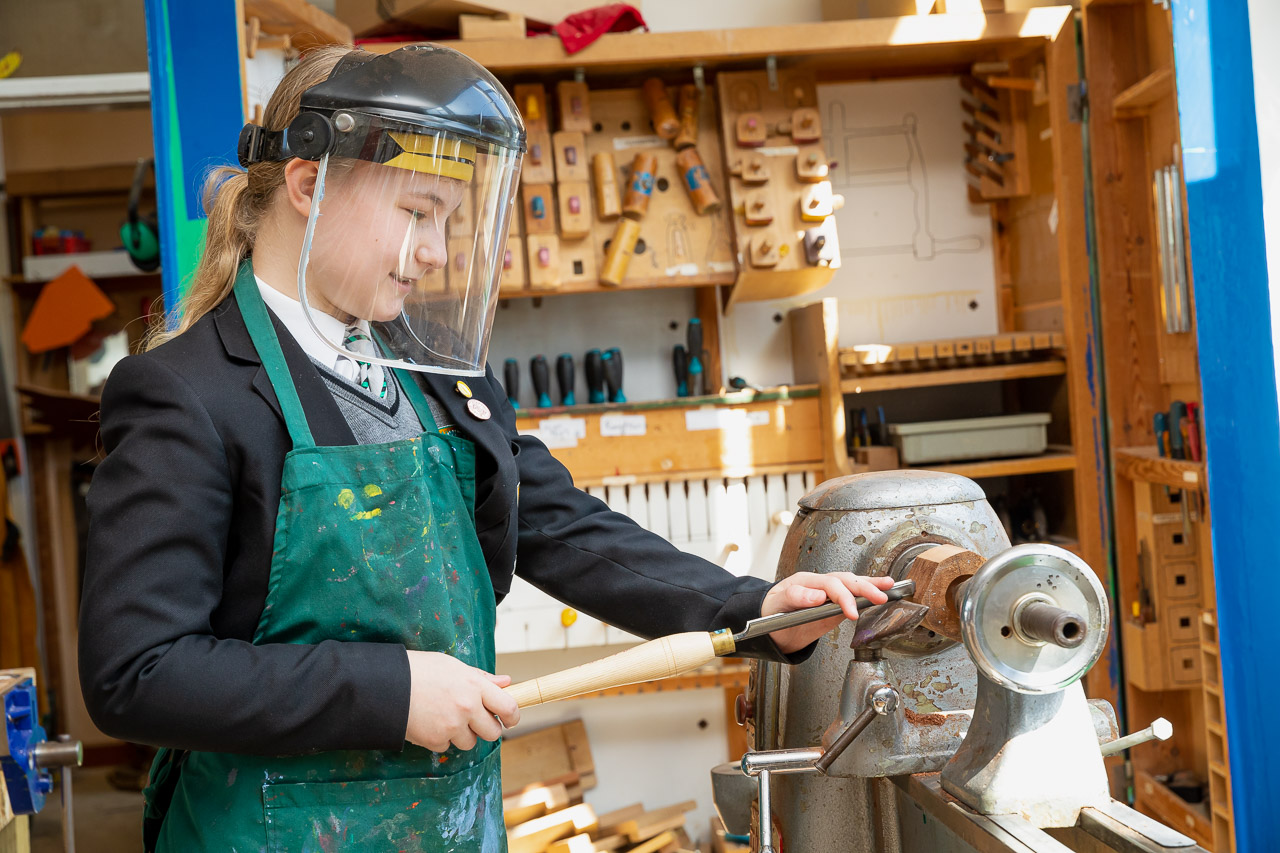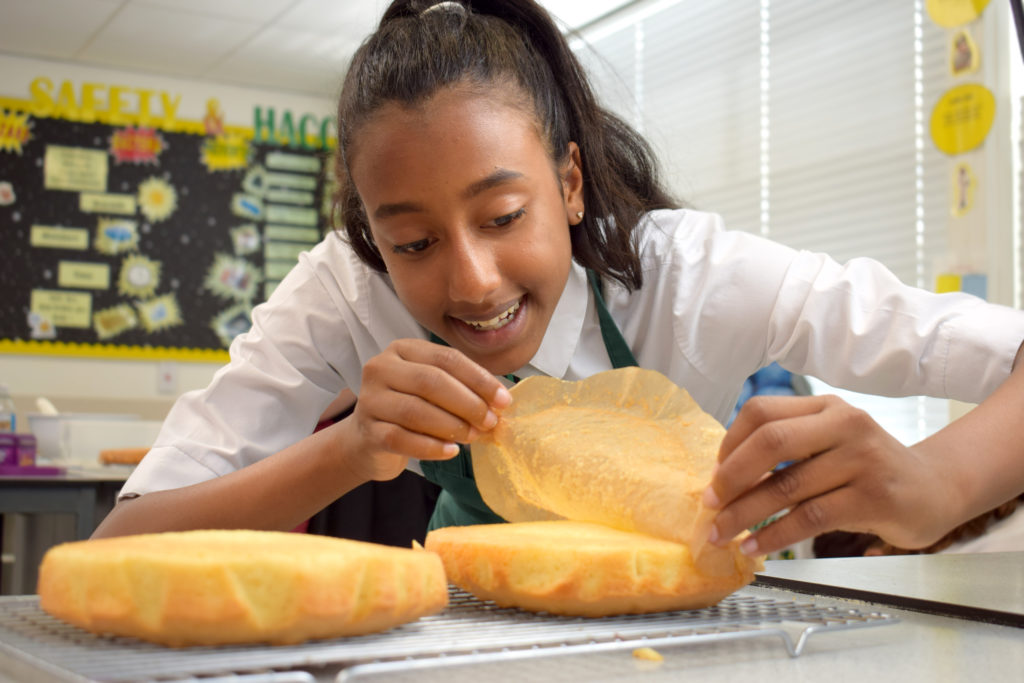Welcome to the Design & Technology
DT lessons at Harrow Way are a dynamic, creative and exciting space for learning while promoting innovation and excellence. We set high standards and expectations for our students so they feel proud of what they have learnt and created. Success further up the school really begins with a good foundation of knowledge and skills delivered with a challenging and engaging approach. Assessment happens in all lessons through verbal and written feedback, with an emphasis on celebrating positive achievement, engagement and effort.
All projects through Key Stage 3 and Key Stage 4 are designed to build confidence and skills across a wide range of materials, techniques and processes using a variety of applications including graphic products, woods, metals, plastics, textiles, composite, smart and modern materials, electronics, systems and control, computer aided design, computer aided manufacture (3D printing, craft robo) and culinary arts. Each project involves practical work and considers a user, purpose, form and function, whilst encouraging risk taking in design decisions. All students are encouraged to think, explore, inquire, challenge and question with lessons taught in mixed ability groups.
Curriculum Content
In DT, students research and explore a variety of real life contexts, working as design investigators and creating solutions to the design problems they have found. This includes reshaping a design brief to develop a design specification and informs the development and manufacture of innovative, functional, appealing products that respond to the needs of a customer in a variety of situations.
During KS3, students explore different design approaches including biomimicry, iterative and user-centred design to generate creative ideas and use annotated sketches, detailed plans and 3D modelling to present their findings. Students manufacture their designs using specialist tools, techniques and processes whilst considering the material properties they are dealing with. Evaluation is initially based upon analysis of past and present professionals to develop and broaden their understanding while continuously considering new and emerging technologies, before evaluating their own final products.
In Catering pupils gain a wealth of practical experience and cook every other week in our catering room. Pupils study areas focused around nutritional understanding and investigate food choices for different groups such as vegetarians, coeliac sufferers, food choice based on religion or culture. This underpins any continued study into culinary arts for pupils who choose to take the subject at KS4.
The KS3 curriculum is delivered in four rotations which focus on different specialisms for a 9 or 10 week period per rotation with pupils studying the following broad and varied range of mini-projects:
Key Stage 3
Year 7
Keyring Project: Pupils discover different types of fabrics that can be used in textile design, their sources, uses and sustainability issues around certain decisions designers make when selecting the appropriate materials. They then create a piece of leatherwork, improving manual dexterity and confidence in textile ability.
Chocolate Bar: Pupils create a range of design ideas using CAD programmes such as Photohshop and 2D design to make a wrapper and point of sale for a chocolate bar.During the project, they develop modelling techniques (both using CAD and real life 3D models), Photoshop skills and a deeper understanding of target markets and user requirements.
Flexible Toy: The main focus of this project is to get pupils into a workshop and develop their understanding of woodworking and timber based products. They will use basic woodworking techniques and hand tools while considering the social impact of material selection and the working properties of different products.
Catering: Pupils will learn the core health and safety and food hygiene rules for safe food preparation as well as develop their understanding of nutritional requirements and build up culinary skills creating a range of different food products.
Year 8
Sweet dispenser: Pupils build on their woodworking skills and progress to working with a range of machinery in the workshop as well as the hand tools used in year 7. They extend their understanding of different material areas by investigating and using polymers and have a cultural context to investigate and use for design inspiration.
Board game: Pupils design and make a board game for a specific intended market with a developed understanding of unique selling points and potential stakeholders. They will develop CAD skills, creating components for their game on programmes such as TinkerCad, Photoshop and Illustrator and will create a small 3D printed prototype of a playing piece for their game.
Jewellery: With the jewellery project, pupils use biomimicry as inspiration and influence for their design ideas as well as investigating the Art Nouveau movement to inform their designs. They will then research different types of metals and understand the working properties and tools needed to shape the metals as well as studying the steps to mould making and packaging design.
Catering: In catering, pupils will learn about special diets from a variety of perspectives from health and ethical decisions to religion and culture. Entomology and food provenance are also investigated as pupils continue to expand their knowledge of the culinary arts.
Year 9
The catering course in Year 9 introduces some of the core knowledge and skills pupils will be building on if they continue the course into Years 10 and 11. They will investigate elements such as the kitchen brigade, the hospitality and catering industry and the practices of the industry as well as being part of a large amount of practicals to build skills in areas such as pastries, pasta, cakes, bread and fish and meat preparation and cooking.
Key Stage 4
At Harrow Way we offer the following subjects to study:
WJEC GCSE Hospitality and Catering Level 1/2
Design and Technology encourages students to take risk through a range of focused practical tasks and design and make products showing innovation, creativity and originality, using a range of materials such as paper and card, plastics, textiles, composite materials (cement and wool), electronics, timber based materials and ferrous and non-ferrous metals. Catering gives pupils not only the skills, knowledge and understanding for students to work in the catering and hospitality environment but enables all students to develop a variety of techniques for exceptional products made with style.
Design and Technology and Catering are practical subject areas which require the application of knowledge and understanding when developing ideas, planning, producing products and evaluating them. During Year 10, in Design and Technology, students will work through a range of focused practical tasks that will allow the development and learning of new skills, along with the use of different equipment both CAD and CAM before commencing their controlled assessment in the summer term of Year 10. In Catering, students experiment with a variety of processes and techniques, develop an array of skills, in preparation to commence their controlled assessment, also in the summer term of Year 10.

Assessment
Design and Technology = 50% NEA, 50% exam
The NEA (non-exam assessment) in Design and Technology consists of a single project selected from one of three potential contexts set by the exam board. The end result relies on an array of innovative prototypes that genuinely solve a design problem for an intended user or group. The prototypes are supported by a clear and concise portfolio to show the entire design journey and in total, the submitted NEA folder is worth 50% of the overall GCSE grade.
The design and technology exam is worth the remaining 50% of the overall grade and will test pupils knowledge on the three following areas:
- Core technical principles
- Specialist technical principles
- Designing and making principles
Hospitality and Catering
In Catering the GCSE is made up of 40% Exam and 60% Coursework. The exam is taken in Year 10 electronically and students are assessed on different aspects of the hospitality and catering industry. The coursework section is titled Catering in Action and requires students to cook 4 dishes in a practical exam and produce a portfolio of evidence to support their practical work.
Areas of Study include:
- Food preparation skills
- Food, nutrition and health
- Food science
- Food safety
- Food choice
- Food provenance
- Food preparation and cooking techniques
Why Choose Design & Technology?
As a nation, we are in a time of change and uncertainty yet there are areas of our economy where we currently have severe shortfalls. There are simply not enough people leaving university in the engineering sectors for the amount of jobs. The UK has always lead in these sectors of industry and the Government’s Industrial Strategy sets out to fill the employment gap by promoting STEM subjects. This subject is a good foundation step to access design and engineering careers. You will have the opportunity to design both functional and aesthetically pleasing products, with creativity and originality, using a range of materials and techniques and seek to solve real life design problems.
Future pathways include; A level Product Design at college or sixth form, creative apprenticeships in design and engineering, careers as a product designer, interior designer, model maker, textile/fashion designer, careers in construction and engineering, architecture, stage and set designer, graphic designer, computer games concept designer plus many more.
Design Ventura: A collaborative, real time, ‘Dragon’s Den’ style design challenge and competition run by The Design Museum in London which focuses on developing pupils creativity, innovation and business skills in order to potentially get a product into mass production and on the shelves of the design museum shop.
Architecture: This project allow pupils to investigate the work of designers such as Renzo Piano (The Shard) and draw on a range of influences in order to design a technologically advanced, sustainable building of choice. Pupils will develop their own briefs and specifications in order to create a product that answers a sociological need and has a positive impact on selected groups of people.
Amplifier: Pupils will be introduced to electronic systems in this project and will draw on their workshop and design experience to create a fully functional amplifier to be used with a mobile device. The end product will culminate in the use of a variety of different materials, skills and design methods in order to produce a high quality end product.
Automata: During the automata project, pupils will investigate a range of mechanical systems and devices in order to design and make a piece of automata. Pupils will be given a context to investigate for their project and will explore this in order to create a strong design brief to work from for a specific identified target audience. As part of the project, pupils will also create a well planned manufacturing specification, all the while, developing skills and knowledge in preparation for the Design Technology GCSE.
Why Choose Catering?
25% of all the jobs in this country are in the food industry. We all need to eat, whether this is home cooked food or food bought in a supermarket or restaurant. You will learn how to produce healthy food that is safe to eat and how to choose ingredients wisely from what is on the market. The course combines practical activities with knowledge of food materials. You may even design a new food product.
Future Pathways include; food technologist, dietitian, teacher, cookery writer, food stylist, chef, sports nutritionist, food manufacturer, product developer, environmental health or retail management

